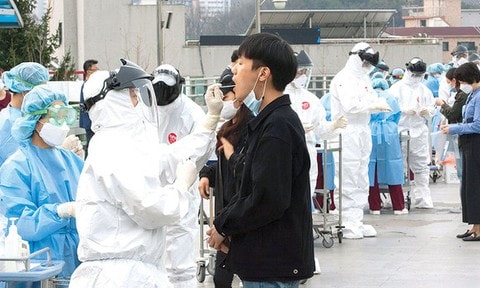Covid-19 pandemic lasts 18-24 months in many places, risk of entering Vietnam still exists
On the morning of May 4, the Ministry of Health announced that no community cases had been recorded for 18 days. According to Associate Professor, Dr. Tran Dac Phu, Senior Advisor of the Vietnam Public Health Emergency Response Center, the epidemic abroad is still complicated, there are places in the world where it is still tense, and the epidemic is expected to last 18-24 months.
According to the report of the Treatment Subcommittee - National Steering Committee for Covid-19 Prevention and Control, up to now, 219/271 Covid-19 patients have been announced to be cured/discharged from the hospital. The latest case (number 271) is a patient who entered the country flying from the UK to Tan Son Nhat Airport on a private flight number AXY 2504 (not a commercial passenger flight).
 |
| Illustration photo |
The remaining 52 COVID-19 patients are currently being treated and monitored at 8 medical facilities, of which 40 patients are being treated and monitored at central hospitals; 11 patients are being treated and monitored at provincial hospitals and 1 patient is being quarantined at district hospitals. Most of the patients are in stable health.
Because the risk assessment of entry cases in this period is higher than the previous period, Ho Chi Minh City has decided that cases in centralized quarantine after entry will be tested 4 times on the first day, 5th day, 10th day and the last day before completing the full 14-day quarantine period. Instead of before, entrants in centralized quarantine were only tested 2 times (on the first and last day of the quarantine period) according to regulations of the Ministry of Health.
In order to strengthen closer monitoring of discharged COVID-19 patients, the Ho Chi Minh City Center for Disease Control has directed daily outpatient monitoring of these cases through daily sample collection until the 30th day after discharge.
In addition, many cases that have been discharged from the hospital for more than 30 days will have their samples taken again for monitoring.
Cases that have complied with the 14-day quarantine after discharge from the hospital, with negative test results on the 15th day, are still at high risk to the community. In addition to continuing daily monitoring by testing as mentioned above, the health sector requires these cases not to leave the house unless absolutely necessary, always wear masks, wash hands regularly, limit contact and avoid close contact with others, and self-monitor their health until 30 days after discharge from the hospital.
The COVID-19 epidemic situation in the country is under good control. However, the risk of the epidemic entering the country still exists, so we need not be subjective in epidemic prevention. The National Steering Committee for COVID-19 Prevention and Control recommends that people continue to implement the following 5-point message to prevent COVID-19:
1. Limit going out as much as possible, only go out when absolutely necessary
2. If you have to go out, always wear a mask and keep a distance, preferably 2 meters.
3. Wash your hands regularly with soap or sanitizer.
4. Regularly clean and ventilate your home, wipe down frequently touched surfaces, and practice healthy living.
5. Make medical declarations, update health status daily, and maintain regular contact with medical staff and medical facilities.
